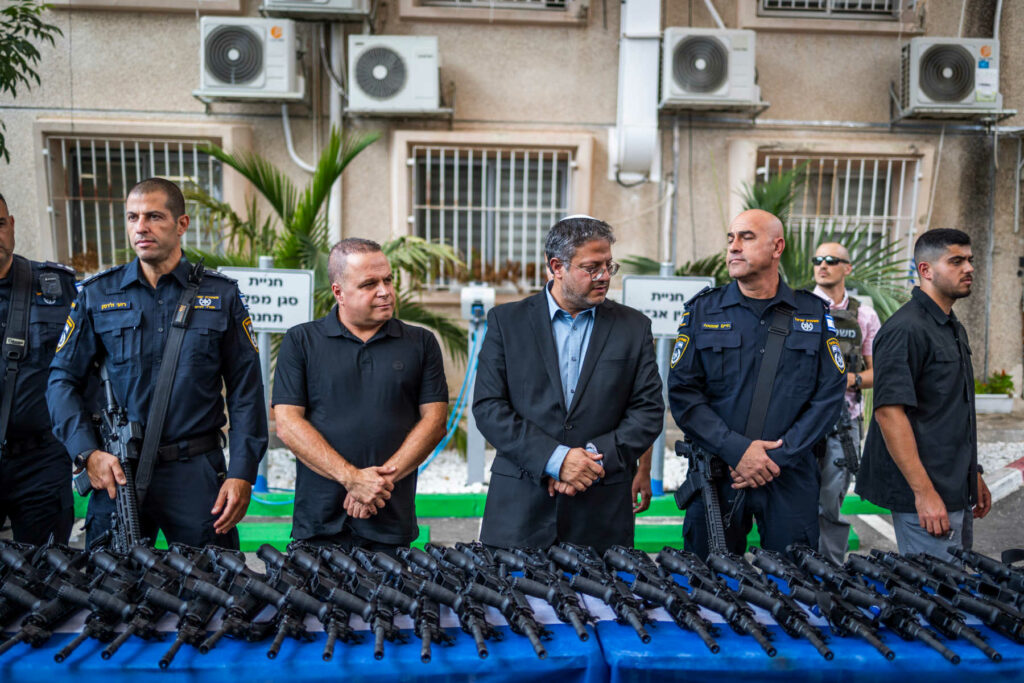Eyal Lurie-Pardes is a Visiting Fellow in the Program on Palestine and Palestinian-Israeli Affairs at the Middle East Institute.
In the aftermath of Hamas's horrific terrorist attack on Oct. 7, Itamar Ben-Gvir, Israel's far-right minister of national security, keeps on pushing his Jewish supremacist agenda, risking new tensions and more violence between Israeli Jews and Palestinians. At the top of that agenda is loosening gun regulations to make it easier for Israeli citizens to acquire firearms and calling for the mass arming of Jews across Israel. According to Ben-Gvir, guns are essential for public safety and for preparing for a "scenario of a Guardian of the Walls 2.0," referring to the riots and intercommunal violence in Israel's mixed Jewish-Arab cities that erupted during national unrest in May 2021 over forced evictions of Palestinians in East Jerusalem and an Israeli military operation in Gaza.
With Israel now consumed by national rage, hostility and fear of Palestinians following Hamas's attack, the new gun policy—arming thousands of Israelis, including settlers—increases the risk of igniting this nightmare scenario.
Ben-Gvir is a long-time proponent of gun ownership. Since he joined the Israeli government in Prime Minister Benjamin Netanyahu's coalition, the gun license rate increased substantially. As part of the Ministry of National Security's response to Hamas's attack, Ben-Gvir passed amendments to the gun licensing requirements aimed at expanding eligibility and speeding the process of issuing a license. These new regulations grant a license within just a week to anyone who meets the new criteria for self-defense, via a new remote screening process. They also postponed expiration dates for current license holders and doubled the number of bullets allowed to be purchased. Since Oct. 7, more than 120,000 people have applied for a gun license in Israel.
Arming thousands of Israelis, including settlers, increases the risk of igniting a nightmare scenario.
- Eyal Lurie-Pardes
Generally, Israeli gun regulations discriminate against non-Jews, making it almost impossible for them to obtain a license. For example, the regulations grant ministry bureaucrats discretion in requiring applicants to provide proof of "sufficient fluency in Hebrew." The new criteria for self-defense, which is at the center of the looser gun regulations, is even more discriminatory. It includes two main requirements: military or national service in designated units, and residency in an "eligible town." Palestinian citizens of Israel are collectively exempted from military service. Even if they had met the service requirement, they would probably be denied a gun license based on their place of residency, because the designated "eligible towns" are overwhelmingly Jewish. The rules also benefit Jewish settlers in the West Bank in particular, since the eligibility favors towns deemed "dangerous" and also beyond the Green Line of 1967. Out of the 100 cities and towns with the highest percentage of gun licenses in Israel, 86 are Jewish settlements in the West Bank.
Another component of Ben-Gvir's gun policy is establishing more rapid response squads—known as kitat konenut in Hebrew—which have long been a part of Israel's public safety in rural areas, especially in the West Bank. These are civilian groups, composed of residents of the village or kibbutz, that act as a volunteer defense force in an emergency until police or the military can intervene. They played a pivotal role in combating Hamas in southern Israel on Oct. 7, when villages and kibbutzim under attack waited many hours, sometimes even longer, for soldiers to arrive.

In the weeks since Hamas's attack, the Ministry of National Security has been working to establish 600 new rapid response squads, but in urban areas as well as rural ones. Similar to the gun licensing criteria, these squads are permitted primarily in Jewish towns and require previous military service, and therefore discriminate against Palestinian citizens of Israel. Unlike rural areas, where there is a risk of an extended gap in response time before police might arrive during a crisis, such volunteer defense forces make less sense in denser urban areas if security is actually the main goal, rather than something else. These armed civilian units are even more untenable in areas with a significant Palestinian community and an influx of Israeli settlers, such as East Jerusalem, where tensions are always high and clashes are frequent.
In practice, these squads create another path for arming Jewish-Israelis. As Daniel Seidemann, an Israeli lawyer and the founder and director of the NGO Terrestrial Jerusalem, has warned, they could end up looking more like Ben-Gvir's own "private militias." For instance, two squads in East Jerusalem were recently founded in Ir David and Nof Zion, small Jewish outposts composed of far-right settlers in the heart of the Palestinian neighborhoods of Silwan and Jabel Mukaber.
Unlike most law enforcement policy in Israel, which is determined by the police independently of the Ministry of National Security, gun regulation and administration are entirely under the ministry's authority—which Ben-Gvir is using for his own political ends. By easing the distribution of more guns to Israelis, including many settlers, Ben-Gvir—who is a settler himself—is hoping to boost his militaristic public persona and whip up even more anti-Palestinian hysteria. He has made public handouts of guns into a media carnival, even occasionally handing out the guns himself on camera and promoting the photos and videos on social media.
These photo-ops recently alarmed U.S. officials, who expressed concern that weapons provided to Israel by the United States would be used to arm citizens and for Ben-Gvir's political photo-ups, rather than be delivered to the Israeli army or police as intended. After the U.S. threatened to suspend the delivery of 20,000 rifles that the Ministry of National Security has purchased from American suppliers, the Israeli government officially committed to Washington that the rifles would only be distributed by the police or army. However, the rifles could still be given to rapid response squads, because the Israeli police administer them.
By distributing more guns to Israelis, including many settlers, Ben-Gvir—a settler himself—is hoping to boost his militaristic public persona and whip up even more anti-Palestinian hysteria.
- Eyal Lurie-Pardes
A policy to arm up so many Israelis could inflame already high tensions between Jews and Palestinians within the Green Line and in East Jerusalem. In recent weeks, unlike the events of May 2021, there were no major riots in mixed Arab-Jewish cities or clashes in East Jerusalem. But this relative quiet is fragile, especially at time when many Israelis describe every Palestinian as "the enemy." This rage toward Palestinians is evident in right-wing groups that have attacked Palestinian students and left-wing activists in Israel. In such a volatile situation, arming so many Israelis, who still lack sufficient training to use a gun, could fuel a new wave of national unrest.
Loosening gun regulations is especially dangerous in the West Bank, where settler violence has surged since Oct. 7, with attacks killing at least 115 Palestinians, wounding more than 2,000 and forcibly displacing some 1,000 Palestinians from their homes. Settler violence had already been on the rise for the past year. Arming practically every settler, as Ben-Gvir wants, will only lead to even more violence. After Hamas's attack, the head of the Binyamin Regional Council, the municipality for nearly 50 settlements and outposts in the central West Bank, stated that "every Arab that gets close to a settlement and risks residents" is a legitimate target.
Ben-Gvir is playing with fire. A new round of intercommunal violence much worse than May 2021—"Guardian of the Walls 2.0," as Ben-Gvir put it—could become a self-fulfilling prophecy. Even after this war in Gaza eventually ends, all these additional weapons and new militia-like defense squads will have created a dangerous new reality across Israel.







































